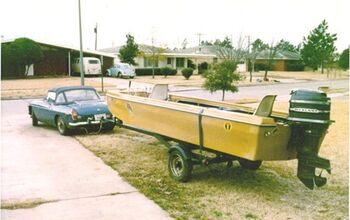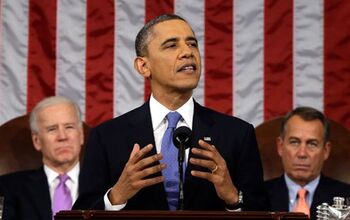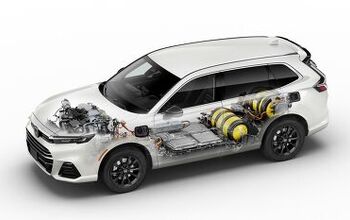State of the Union
For over 60 years, The United Autoworkers Union (UAW) has sold itself as the protector of America’s working class. According to their web site, “We’ve used our bargaining power to demand – and win – a role for union members to ensure that consumers receive the highest possible quality cars and trucks.” Regardless of your view of the quality of UAW-built vehicles, the union’s gained tremendous power on the factory floor, secured a group of benefits that are the envy of workers everywhere and amassed a mountain of money. So, now that GM and Ford are in trouble, will the UAW give anything back? Here’s what the union has to lose…
The Big 2.5’s UAW members receive an average wage of $29.75 per hour and full medical coverage. They also get an average of 16.5 paid vacation days per year, on top of three weeks paid vacation (Canadian members get four weeks). UAW workers who transfer to a plant “outside of their area” get a $25k relocation allowance– even if they don’t change residence. Employment is guaranteed.
The UAW’s Director of Public Relations reports that only 40% of his union's membership work on automotive assembly lines. Paul Krell says the rest are drawn from a wide range of other industries— from casinos to government-funded schools. But even as the UAW successfully broadens its base, the total number of dues paying members has declined dramatically. According to Department of Labor, the UAW lost 144,719 active members from 2001 to 2005. The loss leaves them with 557,099 active members and over 500k retired members spread throughout the United States, Canada and Puerto Rico.
Crucially, despite the drop in membership, the UAW’s assets continue to grow. Over the same four years, the union’s financial holdings have increased by $93,722,955. At the end of 2005, the UAW reported assets totaling $1.235b, including over three-quarters of a billion dollars worth of treasury securities. The union earned $54.4m in interest income during 2005, mostly from their $914m strike fund.
Even when the UAW makes concessions, their cash flow remains sacrosanct. For example, the UAW struck an agreement with Chrysler that permanently denies seniority or full employee status to "temporary" employees at the automaker's Belvidere, Illinois facility. These “temps” receive 70 percent of a full timer’s pay as long as they work. After seven months, they get minimum healthcare benefits. And what do one third of Belvidere’s workers get in exchange for foregoing the usual union-negotiated benefits? They get to pay full union dues and vote on UAW-Chrysler contracts. And that’s it.
It must be remembered that the UAW has some pretty heavy expeneses, albeit mostly overhead. In 2005, the union spent $8.2m on lobbying and political activities. Another $88m went to UAW employees’ salaries. Forty-two million more covered the UAW employees' benefits. Even if union dues drop, these payouts will continue apace. According to union rules, the Executive Board can divert $50m from their strike fund to their general fund to support operations (as they did at this year’s convention in Las Vegas). In fact, they can transfer up to $60m per year from the same source for the next four years.
In short, the UAW is a large and extremely well-funded organization. Active members enjoy high wages and benefits (estimated by bankrupt auto parts supplier Delphi to cost $76 per hour) along with unassailable job security. Retired members also receive an extremely generous pension and excellent health care provisions. But now that Ford and GM have paid off tens of thousands of the union’s senior members, it’s the less tenured and “temporary workers” who hold the key to the UAW’s— and the automakers’ —future.
Ford and GM’s worker buyout programs have removed the workers who can most afford to make concessions. It’s highly unlikely that the remaining, less well-paid UAW members will agree to significant cuts to their compensation. Union bosses know that holding the line on wages, pensions and benefits could throw Ford and GM into Chapter 11. They also know that large concessions would trigger wildcat strikes, which could also lead to Chapter 11. But most importantly of all, they know they have the cash and non-automotive member base to survive a nuclear winter.
Given these factors, the UAW will do everything in their power to maintain the status quo. In the main, they’ll hold the line on their current compensation. At the same time, they'll dress-up minor concessions as "historic givebacks:" proof of their concern for their employers' well-being. (The tactic will absolve them of any blame if and when the automakers go belly-up.) The “radical” union members are the fly in the proverbial ointment. Whether or not the union bosses can keep them in line will ultimately determine the timing of Detroit’s terminal decline.
More by Frank Williams
Latest Car Reviews
Read moreLatest Product Reviews
Read moreRecent Comments
- Corey Lewis It's not competitive against others in the class, as my review discussed. https://www.thetruthaboutcars.com/cars/chevrolet/rental-review-the-2023-chevrolet-malibu-last-domestic-midsize-standing-44502760
- Turbo Is Black Magic My wife had one of these back in 06, did a ton of work to it… supercharger, full exhaust, full suspension.. it was a blast to drive even though it was still hilariously slow. Great for drive in nights, open the hatch fold the seats flat and just relax.Also this thing is a great example of how far we have come in crash safety even since just 2005… go look at these old crash tests now and I cringe at what a modern electric tank would do to this thing.
- MaintenanceCosts Whenever the topic of the xB comes up…Me: "The style is fun. The combination of the box shape and the aggressive detailing is very JDM."Wife: "Those are ghetto."Me: "They're smaller than a Corolla outside and have the space of a RAV4 inside."Wife: "Those are ghetto."Me: "They're kind of fun to drive with a stick."Wife: "Those are ghetto."It's one of a few cars (including its fellow box, the Ford Flex) on which we will just never see eye to eye.
- Oberkanone The alternative is a more expensive SUV. Yes, it will be missed.
- Ajla I did like this one.


































Comments
Join the conversation
Unions are un-american . today when people hear unions they think lazy and fat poor quality work and high pay. there is no problem with the quality of american cars. they are spoiled and dont know how to work hard . it makes me ashamed of my country men. unions have not been needed since the 50's . they and not the quality is what has hurt our reputation. and driven up proces on everything from cars to oil . we are not going to fix things in the auto industry until we get of the UAW. shame on them now when FORD, GM need them . they are as greedy as ever